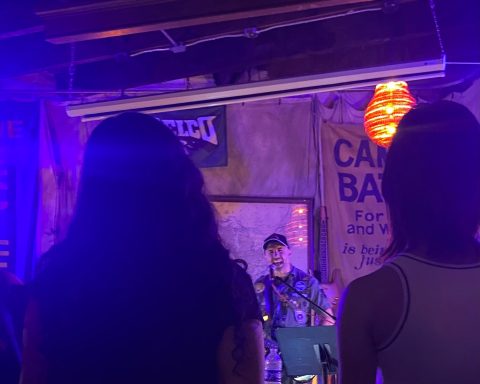Editor’s note: This article was initially published in The Daily Gazette, Swarthmore’s online, daily newspaper founded in Fall 1996. As of Fall 2018, the DG has merged with The Phoenix. See the about page to read more about the DG.
This article is the first in our series, Introduction to the New Editors. Nicole Liu is a new Arts and Features Editor for The Daily Gazette. The following is part two of a two part article.
McDonald’s
Here is something that may amaze you, American readers. As a kid in China, going to McDonald’s can be seen as a reward, a novelty, or even a small luxury. It is not because McDonald’s has suddenly elevated their status from junk food retailers to fine cuisine — we have all the basics (Big Mac, McNuggets and so on) in maybe slightly smaller portions that are just as unhealthy and taste the same. But I certainly remember that during elementary school, if your parents have the willingness and the means to throw you a party at the local McDonald’s, you’ll be sensational for a solid while.
I have reasoned with myself that any distinctly American brand (McDonald’s included) has automatic allure in China, and that sort of imported sexiness is going to go away once I see the same thing in Boston. What I didn’t expect, however, is that there is a negative social connotation associated with McDonald’s in particular, and that of all the fast food chains popular in Boston, McDonald’s seems to be at the bottom of the pyramid (maybe resulting in lower prices as well). I predict that though my friends joke about my love for Wendy’s constantly, they are going to laugh extra hard if I had been obsessed with McDonald’s instead; in my mind, however, there had been no significant distinction between the two brands before, because, besides the fact that one is cheaper than the other, they are both pleasures that make me equally guilty.
Is it because the American public has been more systematically exposed to the sometimes unethical, sometimes unhygienic, and sometimes just plain visually disgusting production and preparation process at McDonald’s (think the popular association between McDonald’s and pink slime)? While junk food in China is widely recognized to be unhealthy (a health issue), it was not necessarily recognized as trashy (a social issue). Or has McDonald’s always been seen as trashy, and that the myth of importation made it weirdly special and celebrated in China? There was a witty catchphrase: “国外路边摊, 国内装高端,” which can be interpreted as “street-vendors common to foreign countries become high-end in China”, the “somehow” in the sentence very much implied.
Anyway, this catchphrase was invented a couple of years ago for Starbucks, which at one point had opened a store in the Imperial Palace, a site of extreme historical and symbolic importance to traditional Chinese culture.
Thrifting/vintage shopping
During junior year of high school, when my friend’s exchange student from Barcelona: “so where do you shop for clothes?”, the first thing that came to my mind was the second-hand clothing store in Cambridge I frequent, where I can find new or lightly-used clothing for sometimes a quarter of its original price. To me and my friends, some of our best bonding experiences happened in thrift stores all across Boston and its surrounding suburbs: in addition to the actual clothing we wanted to try on, we would find one or two pieces of clothing outrageously outside each other’s fashion comfort zone and coax each other to try it on. One time, a sharp dresser had to take off her well-cut, business-chic shirt and skirt and put on a beauty-pageant dress from the 60s, complete with hot-pink bodice, puffy sleeves and skirt, and an actual pale green sash attached. Our phones were ready when she walked out of her dressing room, and the way that monstrously poofy dress swallowed her was forever captured. Prime blackmail material.
The Spanish exchange student was not impressed: “you buy clothing people have worn? Yuck!”
Thrift stores and stores selling second-hand clothing are also extremely uncommon in China. We do have antique stores and vintage clothing shops that trade haute couture, but the normalcy of buying second-hand goods, especially clothing, is non-existent. The scrunched-up face of the exchange student was probably the same face I made when I first heard of the concept. Yet thrifting and vintage-shopping have became a main source of fun very early on in my American experience.
Conclusions:
My impression of America and my experience of integration are constantly and continuously developing things. There are also moments when I feel like I could confidently masquerade as — or even consider myself to be — a cultural native. During winter break, I met up with an old pal who was going to college in Florida. Inspired and buttressed by the (so, so painfully American) internet meme “Florida Man” as well as some favorite segments of John Oliver (the British Comedian adored by liberal America), I asked if Florida is really as hilariously weird as the the internet claims, to which she replied: “no, not really, but I gotta say it doesn’t seem to be very pedestrian friendly, as I constantly fear I’m going to be run over by cars,” a statement which made us cackle like crazy, apparently confirming that Florida is indeed much stranger compared to Massachusetts.
“What Florida seems to America,” I said, “is comparable to what America seems to the rest of the world, which can be summarized by the simple sentence ‘what on earth is going on over there?’”
An early realization I have formed while living here, which was continuously confirmed by my experiences, is that America is a very large country, and its citizens have a copious amount of inside jokes based on regional stereotypes. The increasing conversations (and the increasing amount of fun) I had about how these stereotypes are confirmed or subverted, as I see it, reflect how I’m integrated into American culture and humor.
Yet despite living in America during my formative years, there are still moments when I feel taken aback and question whether this is because I am still a cultural outsider. For example, recently I was gently yet firmly informed by a new friend that by shopping at thrift stores, I am taking away resources made available to people who have less economic means than me — a thought that I have never contemplated in my four years living in America, because I guess I just went along with all of these weird things without asking myself: “how did these (social) institutions come into being?” or “what sort of (social) effects do they have?” or “how may I as an individual be contributing to the perpetuation of these specific (social) effects?”– questions that come from what I consider to be a distinct American angle. I did not learn about the difference between a thrift store (where clothing are donated for a charitable institution) and a second-hand clothing store or vintage shop (where second-hand clothing are bought and sold mostly for profit), for my friends and I seem to have the same amount of fun in both. Although this new critique about my enthusiasm for thrifting unsettled me briefly, I wonder if the fact that my opinions on a novel idea acquired from America have developed indicates that I have been immersed into American culture enough to tune into its daily subtlety, contradictions, and impasses.














The first time I heard that criticism of shopping at thrift stores, I thought it was suspect, and I say that as someone who was born here. Thrift stores do provide opportunities for people of little economic means to shop for gently used goods at really great prices. But that is not the only purpose of a thrift shop. They also make money for the organizations they support, such as the Salvation Army or Goodwill, to support their other programs. (Think about it – they get their goods for free, so it’s nearly all profit, even at those low prices. They want to move goods in quantity. That’s their corner on the market.) They provide employment opportunities. I have seen them close because of lack of customers, which is really unfortunate.
People of all means can shop there – you buying a t-shirt for $2.50 is not the same as ripping a t-shirt off of someone’s back. They just can’t buy *that* particular t-shirt if you do. But there will always be more t-shirts. It’s not like you are buying a kidney for $2.50 that someone else desperately needs. You are buying goods that are roughly interchangeable; this pair of pants is just as functional as that one, unlike getting a matching kidney, which is rare. Furthermore, the goods would otherwise end up in the trash, which is stupid. We live in an incredibly wasteful culture, and anything anyone can save from the landfill and put to good purpose is a good thing.
Also, I have found that aversion to buying used clothes is not necessarily a geographic thing, as in the case of your Spanish exchange student’s reaction. Rather, it seems to be a socioeconomic thing, because I’ve heard the same thing from wealthier Americans. It would be interesting to see a behavioral economist, a philanthropy expert, and a philosopher get together and explore this claim that people of means shopping at thrift stores is wrong. I’ve been hearing this more frequently lately, and I think it just reinforces the marginalization of the poor – we have to make sure they shop at *their* stores and not in *our*stores. We should definitely question this claim and not accept it at face value. It’s one of those things that people feel morally superior for saying, but that doesn’t mean it is the morally correct action.